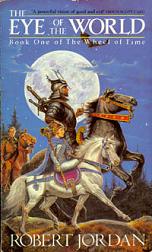
The Eye of the World
Robert Jordan
800 pages
published in 1990
I remember the first time I read The Eye of the World, a year or two after it had been published. At the time I knew nothing about it, but the spine had that weird squiggly sign on it that my local library meant to represent fantasy or science fiction, so I took it off the shelves and started reading. By the time I got past the prologue and on to Rand and his father’s ride to Emond’s Field, I was hooked. And I stayed hooked through the rest of the novel, as well as through many of the sequels. Like many others eventually I stopped following the series when it seemed to have become a neverending story; A Path of Daggers was the last novel I bought, A Crown of Swords the last I’d read.
By that time however I must’ve read The Eye of the World at least a dozen times, rereading the complete cycle every time a new book in the series came out. Especially when I was still supposedly a student, there was many a day when I woke up determined to do some work that day, only to grab The Eye of the World and finish it when it had gotten dark again.